January 2024
Strengthening Teacher Induction & Mentoring in the Federated States of Micronesia
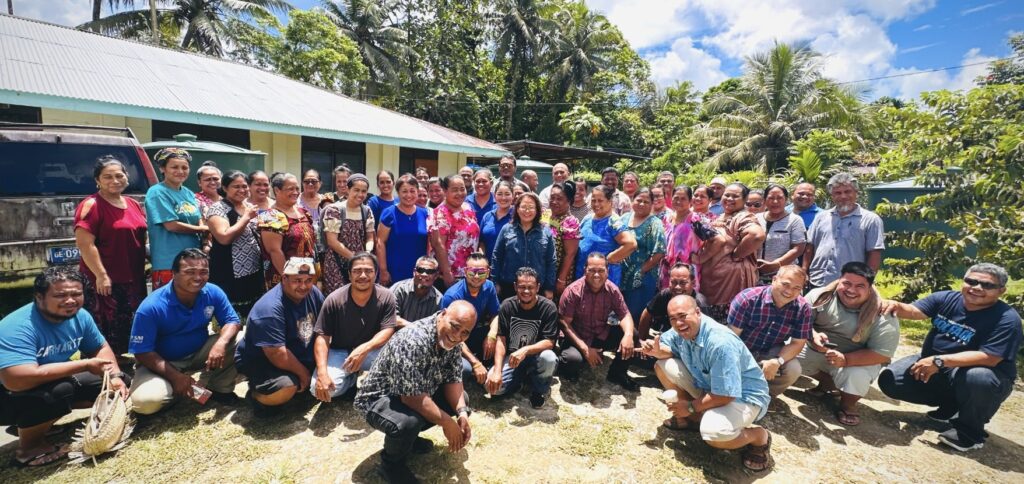
Credit: Emelinda Cabrera
January is National Mentoring Month and the Region 18 Comprehensive Center (R18CC) is celebrating the millions of mentors across the Pacific who step up and generously give their time and care to make sure that our students and educators have supportive relationships and the guidance and skills they need to build sucessful careers.
In the Pacific, R18CC is collaborating with the Kosrae, Pohnpei, and Yap Departments of Education (KDOE, PDOE, and YDOE) to design and implement effective, high-quality teacher induction and mentoring (TIM) programs.
The Federated States of Micronesia (FSM) has identified improving access to a diverse pool of effective educators as an essential component for both school improvement as well as the expansion of educational equity, opportunity, well-being, and positive outcomes for FSM students. FSM posits that a high-quality and culturally responsive induction and mentoring program will play a critical role in building the pool of effective educators to improve access and meet this need.
Studies indicate that new teachers are less likely to leave the profession if they are provided with a mentor in their content area and if they participate in planning and collaborative activities with other teachers (Ingersoll & Smith, 2004; Ingersoll & Strong, 2011). A 2017 Ronfeldt & McQueen correlational study found that teachers receiving induction and mentoring supports were more likely to stay in their school and in teaching even five years later, and a 2009 quasi-experimental study (Stanulis & Floden) (2009) found that teachers receiving intensive mentoring scored higher on a measure of teaching practice than teachers who did not. While there is relatively little research on the impact of induction and mentoring programs in rural and remote settings, state education agencies using induction and mentoring programs as a strategy for growing equitable access to effective educators may choose to prioritize evidenced-based practices from studies that measure and report outcomes specifically for disadvantaged or minority students, and studies that include outcomes such as reducing achievement gaps and diversifying the educator workforce.
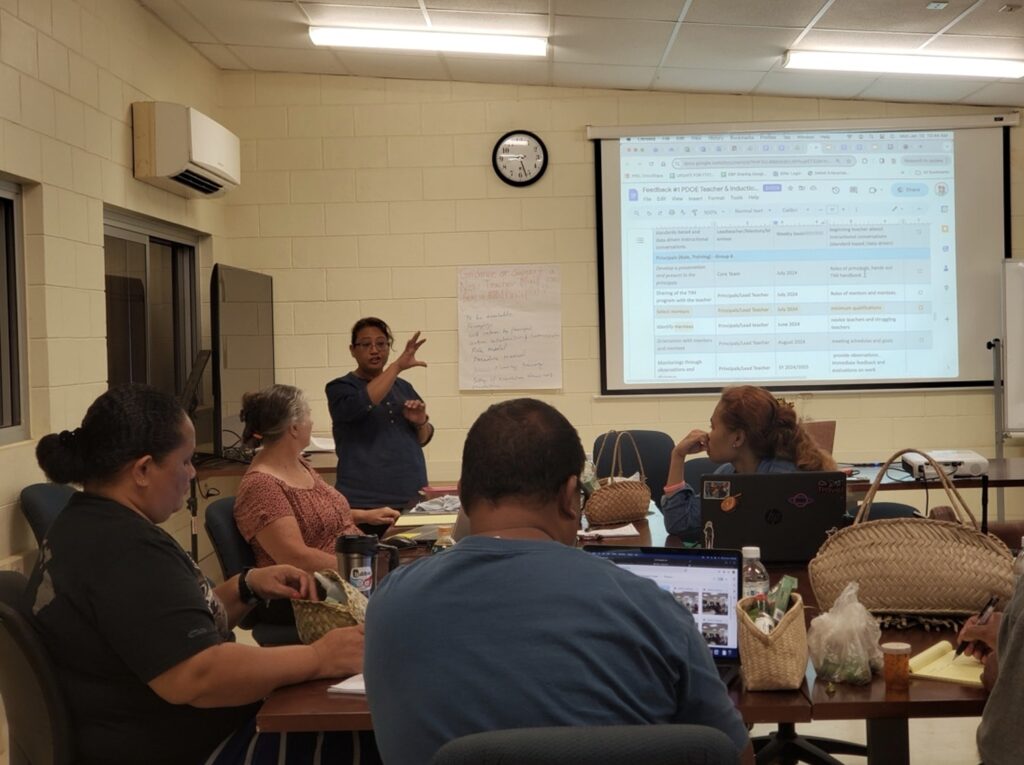
Credit: Caroline Dabugsiy
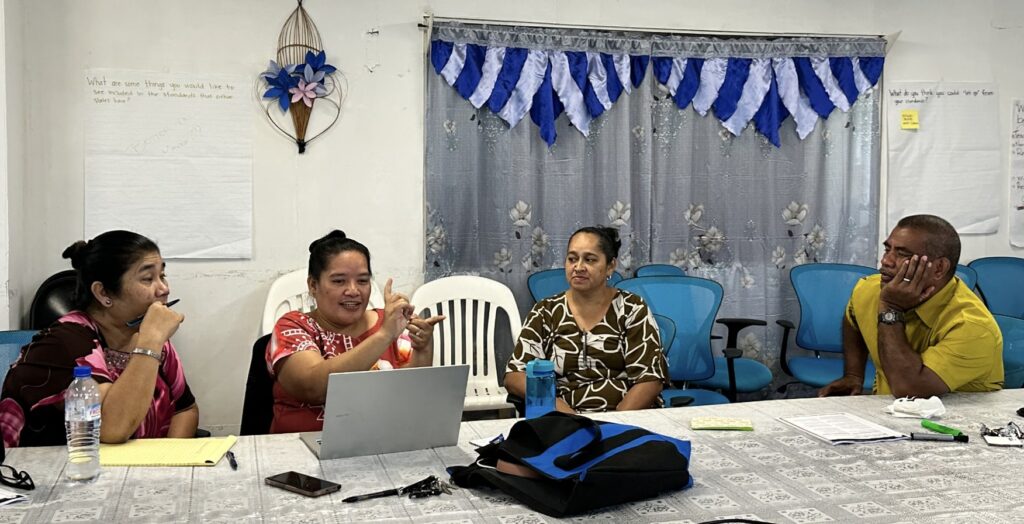
Credit: Lynette Villagomez
FSM has identified limited human capacity to support teacher induction and mentoring across all four states as a high-leverage problem, noting that the KDOE, PDOE, and YDOE have high percentages of new teachers who are in the first three years of the profession and multiple teachers who are teaching out-of-field. According to JEMCO 2022, many FSM educators are teaching with a high school diploma, and about half hold an associate degree. KDOE, PDOE, and YDOE have identified high teacher turnover and teacher quality as key challenges to strengthening student success.
To enhance student success in the FSM and to contribute to a more stable and skilled teaching workforce, R18CC was requested by FSM to grow the human and organizational capacity of KDOE, PDOE, and YDOE school leaders, teachers, and other stakeholder group members by facilitating the development and implementation of high-quality TIM programs in Kosrae, Pohnpei, and Yap.
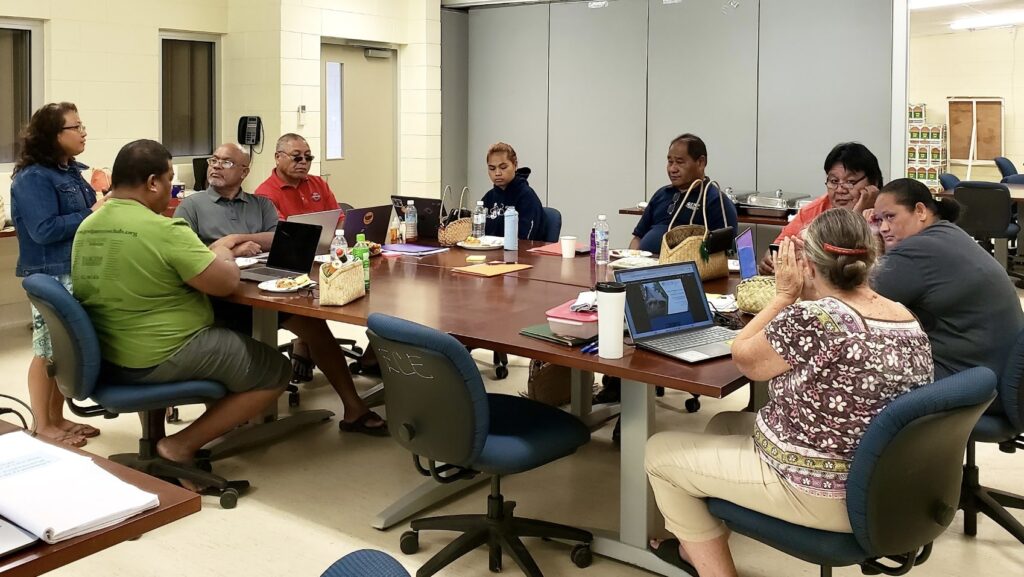
Credit: Caroline Dabugsiy
R18CC capacity building activities began with the dissemination of and facilitated discussions on high-quality induction and mentoring program resources. Early discussions benefited from examples and resources from AIR’s Center on Great Teachers and Leaders, including the Mentoring & Induction Toolkit 2.0: Supporting Teachers in High-Need Contexts resource. State leader capacity was additionally built through an interactive process that included consultative guidance during monthly knowledge-building work sessions, and coaching and provision of exemplars to guide each DOE in the development of TIM policies and guidelines. This collaborative work resulted in the design of comprehensive induction programs in Kosrae, Pohnpei, and Yap. R18CC continues to provide implementation support and guidance through monthly meetings – supporting the state teams as they refine their respective TIM manuals and implementation plans.
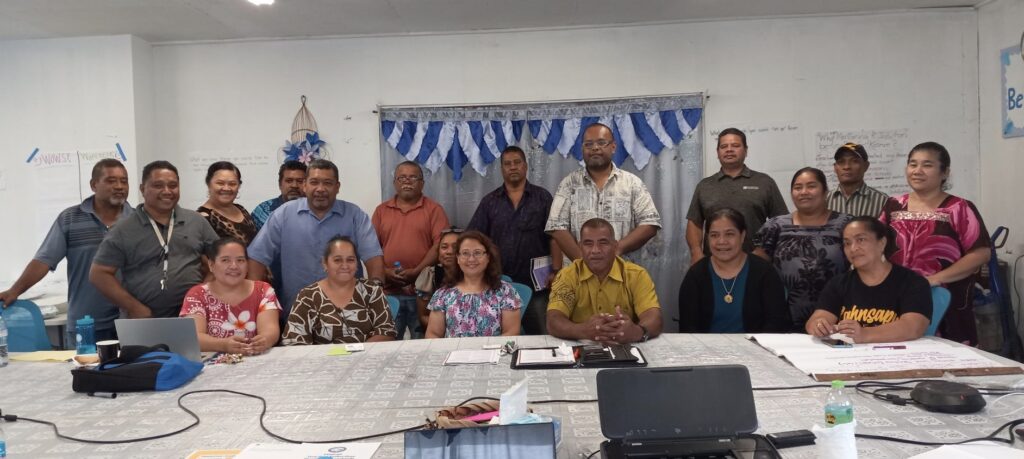
Credit: Lynette Villagomez
“This was the most fascinating workshop I’ve attended. Lots of great information on improvement and the mentoring is an eye opener. I needed that when I first started working but I’ve received a little bit of mentoring and that was it. I had to find my way so imagining how the novice teachers felt, it’s way too overwhelming and stressful.” — TIM Workshop Participant
“… implementation will definitely change the practices of inducting new teachers and continued mentoring of novice & career teachers.” — TIM Workshop Participant
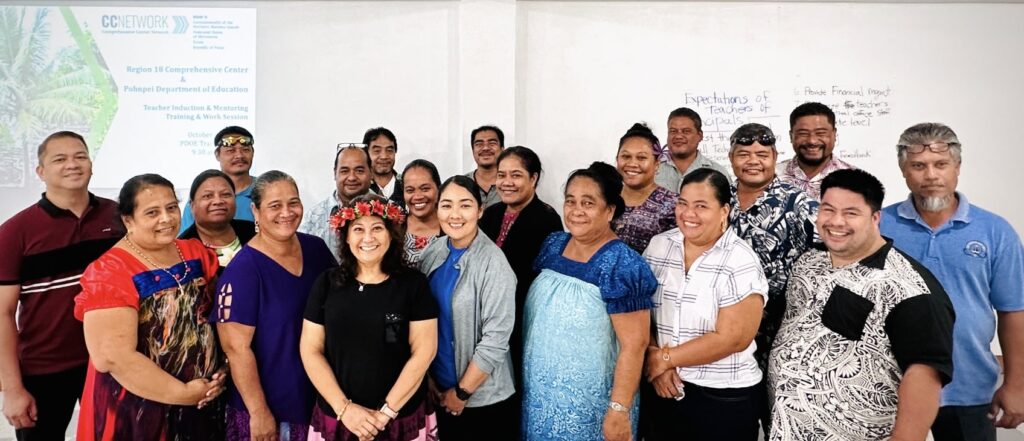
Credit: Emelinda Cabrera
We at R18CC are excited for the work ahead and congratulate the KDOE, PDOE, and YDOE teams for their dedication to strengthening induction, mentoring, and workforce development.
GTL Center. (n.d.). Mentoring & Induction 2.0 Toolkit. Retrieved from
https://gtlcenter.org/technical-assistance/toolkits/mi-toolkit
GTL Center. (2019). Module1-Workbook2-InductionProgramInventory. GTL Center.
https://gtlcenter.org/sites/default/files/Module1-Workbook2-InductionProgramInventory.pdf
New Teacher Center. (2021). Mentor Practice Standards_RB21. New Teacher Center. https://newteachercenter.org/wp-content/uploads/2021/07/Mentor-Practice-Standards_RB21.pdf
New Teacher Center. (2021). TI Program Standards_RB21. New Teacher Center. https://newteachercenter.org/wp-content/uploads/2021/07/TI-Program-Standards_RB21.pdf
New Teacher Center. (2018). Teacher Induction Program Standards. New Teacher Center.
https://newteachercenter.org/resources/teacher-induction-program-standards/
Human Resources in Education. (2017). NTC High-Quality Mentoring and Induction Practices. Human Resources in Education. https://www.humanresourcesineducation.org/wp – content/uploads/2017/06/NTC-High-Quality-Mentoring-Induction-Practices.pdf
New Teacher Center. (2021). High-Quality Mentoring & Instructional Coaching Practices_RB21. New Teacher Center. https://newteachercenter.org/wp-content/uploads/2021/07/High-Quality-Mentoring-Instructional-Coaching-Practices_RB21.pdf
GTL Center. (2019). Module 2: Handout 2 – Roles and Responsibilities of an Effective Mentor. GTL Center. https://gtlcenter.org/sites/default/files/Module2-Handout2-RolesResponsEffectMentor.pdf
GTL Center. (2019). Module 2: Handout 3 – Qualities of an Effective Mentor. GTL Center. https://gtlcenter.org/sites/default/files/Module2-Handout3-QualitiesEffectiveMentor.pdf
GTL Center. (2019). Module 2: Handout 1 – A New Vision for Mentor Recruitment, Selection, and Assignment. https://gtlcenter.org/sites/default/files/Module2-Handout3-QualitiesEffectiveMentor.pdf
GTL Center. (2019). Module 5: Workbook – The Role of the Principal in Mentoring and Induction. GTL Center. https://gtlcenter.org/sites/default/files/Module5-Workbook-RolePrincipalM%26IWkbk.pdf
Google. (n.d.). BLANK Teacher Induction & Mentoring Implementation Plan https://docs.google.com/document/d/107X3xUw1ilSQz4qdhDYuWfnLe4tv1E65/edit
The Art of Charm. (2021, February 11). How to Give Feedback to Anyone | Therese Huston | Art of Charm Podcast [Video]. YouTube. https://youtu.be/yPfz-P-VD6A
High Leverage Practices. (2023). High Leverage Practices. https://highleveragepractices.org/high-leverage-practices
Hawaii Public Schools. (2011). Teacher Induction Standards. Hawaii Public Schools. https://www.hawaiipublicschools.org/DOE%20Forms/Educator%20Effectivness/TeacherInductionStandards.pdf



